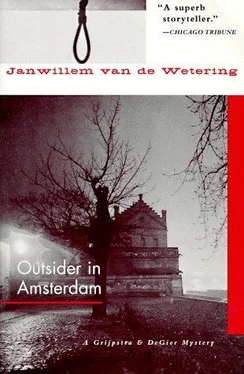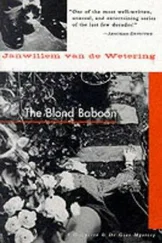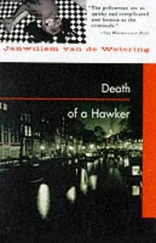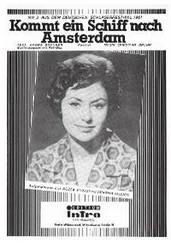Janwillem De Wetering - Outsider in Amsterdam
Здесь есть возможность читать онлайн «Janwillem De Wetering - Outsider in Amsterdam» весь текст электронной книги совершенно бесплатно (целиком полную версию без сокращений). В некоторых случаях можно слушать аудио, скачать через торрент в формате fb2 и присутствует краткое содержание. Жанр: Полицейский детектив, на английском языке. Описание произведения, (предисловие) а так же отзывы посетителей доступны на портале библиотеки ЛибКат.
- Название:Outsider in Amsterdam
- Автор:
- Жанр:
- Год:неизвестен
- ISBN:нет данных
- Рейтинг книги:4 / 5. Голосов: 1
-
Избранное:Добавить в избранное
- Отзывы:
-
Ваша оценка:
- 80
- 1
- 2
- 3
- 4
- 5
Outsider in Amsterdam: краткое содержание, описание и аннотация
Предлагаем к чтению аннотацию, описание, краткое содержание или предисловие (зависит от того, что написал сам автор книги «Outsider in Amsterdam»). Если вы не нашли необходимую информацию о книге — напишите в комментариях, мы постараемся отыскать её.
Outsider in Amsterdam — читать онлайн бесплатно полную книгу (весь текст) целиком
Ниже представлен текст книги, разбитый по страницам. Система сохранения места последней прочитанной страницы, позволяет с удобством читать онлайн бесплатно книгу «Outsider in Amsterdam», без необходимости каждый раз заново искать на чём Вы остановились. Поставьте закладку, и сможете в любой момент перейти на страницу, на которой закончили чтение.
Интервал:
Закладка:
"One-three," Grijpstra croaked.
"Were you in the tunnel?" Sientje asked.
"Yes. Did they catch up with him?"
"No," Sientje said, "they've lost him."
"Where?"
"In that new housing development where all the streets have bird names," Sientje said. "They saw him last in the Hawkstreet and think he is riding about close by now. The patrol car is still looking for him, but I think they have run into a little trouble. They have dented a mudguard."
"We'll go there as well," Grijpstra said, and held on as de Gier made the little car scream through a corner.
"Ha," de Gier said. "Probably ran into something, got their mudguard right into a tire, had to stop, get out and pull the mudguard free, and meanwhile van Meteren smiled and got lost."
"He won't be lost," Grijpstra said. "This is the Gold-finchstreet."
De Gier stopped and switched the engine off.
"No use driving around in circles," he said. "Listen! Can you hear the Harley anywhere? It's quiet here and that motorbike has a very remarkable sound, a deep gurgle."
"No," Grijpstra said.
"The map," Grijpstra said suddenly, "that map in his room!"
"Map," de Gier repeated, "map in his room. The map of the Ussei-lake. You think he has a boat?"
"Yes," Grijpstra said.
"A boat," de Gier shouted, "of course! That map is a proper maritime map, indicating depths and so on. Only a sailor would have a map like that. A boat somewhere. But where is the boat?"
"Close by," Grijpstra said.
"So we hope." De Gier lit a cigarette, inhaled deeply and coughed.
"In Monnikendam," Grijpstra said, "closest IJssellake's port to Amsterdam."
De Gier shrugged. "Could be Horn as well, or Enkhuizen, or Medemblik."
"No," Grijpstra said, "too far. We have a. lot of rain here and it must be damn uncomfortable on that motorcycle. He bought it because it satisfied some need, made him think of his New Guinea days. But this is a cold wet country. He had plenty of money, so he bought a boat and kept it in a harbor close to Amsterdam. He would ride out there, park the Harley, and get on his boat. A nice comfortable boat with a cabin and a little stove. Could make himself a hot cup of coffee and soup and stew, much nicer than going into a restaurant and being stared at. New Guinea is an island, he may have had a boat out there as well. I think the boat is in Monnikendam."
"We can ask Sientje," de Gier said. "She can phone the chief inspector's house. The chief inspector had van Meteren shadowed for a while."
"No use," Grijpstra said and shivered. "Let's get back into the car."
De Gier got into the car.
"No use perhaps. Van Meteren knew he was being followed, ever since Verboom died. So he wouldn't have gone near his boat. You are probably right. His boat was his escape, he wouldn't show us where he kept her. In any case, he couldn't let us know that he owned a boat. He wasn't supposed to have any money. If we could have proved that he had money we would have arrested him on suspicion of murder. He jumped out of the window when I mentioned the name of Seket."
Grijpstra nodded thoughtfully.
"But where is that boat? He must be on her now and the IJssel-lake is big. If he had stuck to the Harley we would catch him easily enough. Every policeman in Holland will be watching for that Harley by tomorrow. He may stick to his boat now, he may have enough food on her to last him for months and we don't know what the boat looks like."
De Gier called Sientje.
"Headquarters," Sientje said, "come in, one-three."
"We think he has a boat and may be on the IJssel-lake by now. We will be leaving the city soon in the direction of Monnikendam. Please alert the State Water Police."
"I will," Sientje said. "Have a pleasant time. Out."
"And that," Grijpstra said, "is the end of Sientje. Another few minutes and she won't be able to hear us."
'Two little men in a biscuit tin," de Gier thought, "and the biscuit tin is going into nowhere." He started the car.
They found nothing in Monnikendam's little port. They left the small city and followed the dikes, keeping close to the lake. Half an hour passed. They met no one.
"There's somebody," Grijpstra said and pointed into the direction of the lake. A small yacht was moored to a jetty.
De Gier put his pistol back into its holster when he got close to the man. The man was tall and had very blond hair.
"Evening."
"Evening," the man said.
"We are policemen," said De Gier, "and we are looking for a small colored man who rides a big white motorcycle. A Harley-Davidson. We thought you might have seen him."
"I have," the man said. "The motorbike is over there, parked behind that hedge. And your man is on the lake, in his boat, a flat-bottom, a hotter with brown sails. But he isn't sailing, he is using his diesel engine. He left about an hour ago."
"Beautiful," Grijpstra said.
"Did he know you were after him?" the man asked.
"He did," de Gier said.
The man shook his head.
"Strange. He seemed quite calm. He even talked to me for a minute. Said he couldn't sleep and was going to spend the night on the water."
"Do you know him at all?" Grijpstra asked.
"Not very well, but his boat has been here for about a year now, we share the jetty, it belongs to a retired fisherman. I have often talked to your man, he is a Papuan isn't he? I always thought he was a very likable fellow, I even asked him to come to dinner once but he refused and I didn't try again."
"Oh, he is a likable fellow all right," de Gier said, "but he is suspected of having committed a murder. We'll have to go after him. Can we use your boat?"
The man smiled.
"Why ask?" he said. "I couldn't refuse anyway. A civilian has to assist a policeman at the first request. That's the law, isn't it?"
Grijpstra smiled as well.
"That's the law. But a civilian can refuse if there is any risk to the safety of his person. So we are only asking for the boat. You don't have to come with us. Just explain to us how we should handle your yacht."
"That's all right," the man said, "I'll come with you. I may be of use. I can handle the boat and I used to be an officer in the commandos. My name is Runau."
They shook hands.
De Gier had gone back to the car, grinning to himself. He brought out the carbine and its six spare magazines, the searchlight and a rope with a heavy metal hook attached to one end.
He had to make another trip to fetch the large tin marked with a Red Cross.
"I hope we won't have to use the tin," he thought.
"You didn't have to bring all that," Runau said when de Gier clambered aboard. "I've got everything on this boat. Everything except the carbine of course." He took the weapon from de Gier and handled it lovingly. "Long time since I've had one in my hands. Much nicer than a rifle but not as deadly. I used to be pretty good with a carbine."
"Give it here," de Gier said. "We shouldn't lead you into temptation."
Runau laughed. "You aren't tempting me. I wouldn't aim it at a man, not even at a bird. I may have been a commando but I respect life."
"So do we," Grijpstra said. "You wouldn't have any coffee aboard, would you?"
"Plenty of coffee," Runau said, and started the yacht's engine. De Gier untied the mooring rope and the slender vessel nosed its way toward the lake.
"Were you going to spend the night on the water as well?" Grijpstra asked.
"Yes," Runau said grimly. "My wife and I don't get on very well lately. I don't always go home after work. It's peaceful out here."
"I see," Grijpstra said.
They watched de Gier rummaging about on the yacht's deck. De Gier was still grinning to himself.
"Your colleague seems to be enjoying himself," Runau said.
"He does. He is an adventurer. This is different to patrolling the streets. He is still a little boy at heart and he reads too many books."
Читать дальшеИнтервал:
Закладка:
Похожие книги на «Outsider in Amsterdam»
Представляем Вашему вниманию похожие книги на «Outsider in Amsterdam» списком для выбора. Мы отобрали схожую по названию и смыслу литературу в надежде предоставить читателям больше вариантов отыскать новые, интересные, ещё непрочитанные произведения.
Обсуждение, отзывы о книге «Outsider in Amsterdam» и просто собственные мнения читателей. Оставьте ваши комментарии, напишите, что Вы думаете о произведении, его смысле или главных героях. Укажите что конкретно понравилось, а что нет, и почему Вы так считаете.












